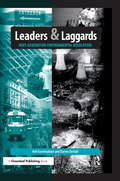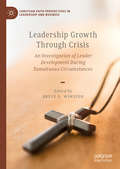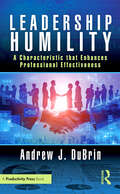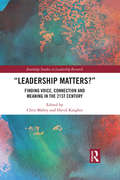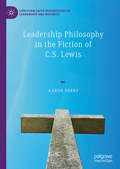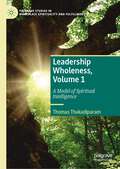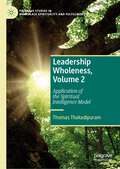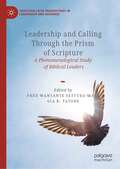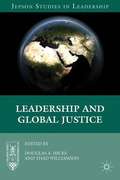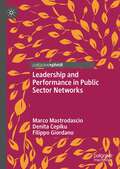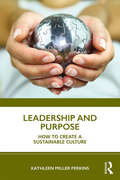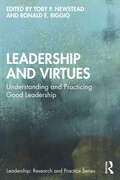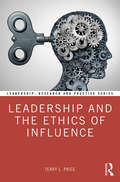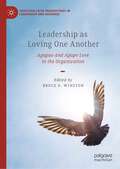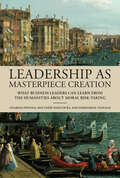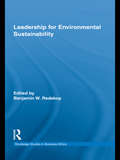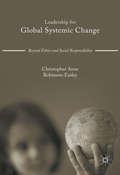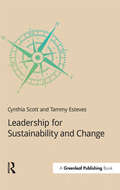- Table View
- List View
Leader-Member Exchange and Organizational Communication: Facilitating a Healthy Work Environment (New Perspectives in Organizational Communication)
by Leah M. Omilion-Hodges Jennifer K. PtacekIt is hard to overstate the importance of the leader-member exchange relationship. Employees who share a high-quality relationship with their leader are more likely to earn a higher salary, climb the ranks more quickly, and report higher life satisfaction levels than their peers who have a less copasetic leader-member relationship. While Leader-Member Exchange Theory (LMX) research addresses the impact that the leader-member relationship has on the individual employee experience, much of this scholarship overlooks or obscures the vital role that communication plays in the development and maintenance of workgroup relationships. Much of extant literature also glosses over the role that communication plays in workgroup collaboration. Using a communicative lens, this text illustrates the complex theoretical underpinnings of LMX theory, such as the importance of social interaction and relationship building and maintenance necessary to achieve organizational goals. We explore how an employee’s relationship with their leader also shapes their peer relationships and their overall standing within their workgroup. Further, the text examines the potential dark side of LMX theory, such as the tendency towards demographic and trait and state similarity. Employing a communicative perspective emphasizes the extent of position and personal power both leaders and members have in engineering the quality of the relationship they desire. Integrating and applying once disparate lines of academic literature, this book offers employees, students, and teacher-scholars pragmatic yet research-based insights into developing and maintaining successful, healthy workplace relationships.
Leaders and Laggards: Next-Generation Environmental Regulation
by Darren Sinclair Neil GunninghamConsensus is growing internationally that traditional command-and-control approaches to environmental regulation have borne much of their low-hanging fruit. Yet it is far from clear what should complement or replace them. Regulatory agencies and policy-makers are struggling with a lack of information about regulatory reform, about what works and what doesn't, and about how best to harness the resources of both government and non-government stakeholders. Progress is being impeded unnecessarily by a lack of shared knowledge of how similar agencies elsewhere are meeting similar challenges and by a lack of data on the success or otherwise of existing initiatives. Despite recent and valuable attempts to deal with such problems in the European Union and North America, these remain islands of wisdom in a sea of ignorance. For example, when it comes to dealing with small and medium-sized enterprises, very little is known, and what is known is not effectively distilled and disseminated. Much the same could be said about the roles of third parties, commercial and non-commercial, as surrogate regulators, and more broadly of many current initiatives to reconfigure the regulatory state. Based on the authors' work for the OECD, Victorian Environmental Protection Authority and the Western Australian Department of Environment Protection, Leaders and Laggards addresses these problems by identifying innovative regulatory best practice internationally in a number of specific contexts, evaluating empirically the effectiveness of regulatory reform and providing policy prescriptions that would better enable agencies to fulfil their regulatory missions. Focusing primarily on the differing requirements for both corporations and small and medium-sized enterprises in North America and Europe, the book aims to complement existing initiatives and to expand knowledge of regulatory reform by showing: how existing experience can best be put to practical use "on the ground"; by drawing lessons from experiments in innovative regulation internationally; by reporting and extrapolating on original case studies; and by advancing understanding on which instruments and strategies are likely to be of most value and why. The authors argue that the development of theory has outstripped its application. In essence, Leaders and Laggards aims to ground a myriad of theory on the reinvention of environmental regulation into practice. The book will be essential reading for environmental policy-makers, regulatory and other government officials responsible for policy design and implementation, academics and postgraduate students in environmental management, environmental law and environmental policy, and a more general readership within environmental policy and management studies. It will also be of interest to those in industry, such as environmental managers and corporate strategists, who are considering the use of more innovative environmental and regulatory strategies, and to environmental NGOs.
Leaders at War: How Presidents Shape Military Interventions
by Elizabeth N. SaundersOne of the most contentious issues in contemporary foreign policy—especially in the United States—is the use of military force to intervene in the domestic affairs of other states. Some military interventions explicitly try to transform the domestic institutions of the states they target; others do not, instead attempting only to reverse foreign policies or resolve disputes without trying to reshape the internal landscape of the target state. In Leaders at War, Elizabeth N. Saunders provides a framework for understanding when and why great powers seek to transform foreign institutions and societies through military interventions. She highlights a crucial but often-overlooked factor in international relations: the role of individual leaders. Saunders argues that leaders' threat perceptions—specifically, whether they believe that threats ultimately originate from the internal characteristics of other states—influence both the decision to intervene and the choice of intervention strategy. These perceptions affect the degree to which leaders use intervention to remake the domestic institutions of target states. Using archival and historical sources, Saunders concentrates on U.S. military interventions during the Cold War, focusing on the presidencies of Eisenhower, Kennedy, and Johnson. After demonstrating the importance of leaders in this period, she also explores the theory's applicability to other historical and contemporary settings including the post–Cold War period and the war in Iraq.
Leadership
by Ken Kurson Rudolph W. GiulianiHaving inherited a city ravaged by crime and crippled in its ability to serve its citizens, Giuliani shows how he found that every aspect of his career up to that point-from clerking for the formidable judge who demanded excellence (and rewarded it with a lifetime of loyalty) to busting organized crime during his years as a federal attorney -shaped his thinking about leadership and prepared him for the daunting challenges ahead. Giuliani's successes in turn strengthened his conviction about the core qualities required to be an effective leader, no matter what the size of the organization, be it an international corporation or a baseball team. In detailing his principles of leadership, Giuliani tells captivating stories that are personal as well as prescriptive.
Leadership Behaviours for Effective Policing: The Service Speaks
by Martin Wright Mark KilgallonAn essential handbook of policing leadership behavioural skills for both professional police officers and policing students aspiring to join the force. The behaviours examined are of relevance to all ranks and roles, from a newly appointed police constable to an executive officer.Behavioural soft skills are essential to effective policing practice and professional development, and are particularly significant in leadership and management roles. This handbook examines the key leadership behaviours and focuses on discreet aspects within policing as well as describing a career timeline. In addition it provides a unique opportunity for leaders to articulate the effects the Covid-19 pandemic has had on law enforcement, examining the impact on policing behaviours and what the blockages are.Each chapter is written by a well-established serving police leader or policing scholar, bringing together a wealth of experience and understanding and applying this knowledge in context through key case studies and examples. It bridges the gap between theory and practice so readers can apply what they have learnt to their policing roles and effectively formulate and describe their own leadership philosophy and style.This is a companion book to Behavioural Skills for Effective Policing.
Leadership Growth Through Crisis: An Investigation of Leader Development During Tumultuous Circumstances (Christian Faith Perspectives in Leadership and Business)
by Bruce E. WinstonThis edited collection uses a biblical lens to explore how to lead effectively and grow in a crisis situation. The chapters examine topics such as communicating through crisis, developing organizations and leaders through crisis, personal crisis and leadership development, and ethics and morality in crisis. Case studies include David's response to Goliath's challenge, Joseph's leadership and management of Egypt, and the team leadership and resilience of Esther and Mordecai in navigating a possible Jewish genocide.This book makes a unique contribution to the crisis leadership literature by examining the topic from a Christian perspective and will foster future research into the role of spirituality in organizational crisis.
Leadership Humility: A Characteristic that Enhances Professional Effectiveness
by Andrew J. DuBrinThis book deals in depth with an ancient attribute of effective leaders that has in recent years caught the attention of leadership writers and researchers. Today’s effective leader is expected to demonstrate humility in addition to standard leadership attributes such as self-confidence, high-level cognitive skills, creativity, charisma, and the ability to articulate visions. The theme of this book is that leadership and professional effectiveness are enhanced when interspersed with other key leadership attributes including those mentioned above, assertiveness, a sense of humor, and strategic thinking ability. Many brash and aggressive successful leaders would be even more successful if they sprinkled their leadership approach with humility.This book describes an opinion about the most relevant aspects of humility as it applies to leadership and professional effectiveness, yet the emphasis is on leadership. Equally important, each chapter contains suggestions for making better use of humility. Humility as it relates to leadership and professional effectiveness is covered from many angles. Among these topics are the many meanings and components of humility and how leadership humility impacts group member performance and behavior. We also describe the attributes of humble leaders and professionals and their type of interpersonal relationships. Servant leadership, because of its tie-in with humility, receives a separate chapter.A description is provided about how narcissism, hubris, and charisma can be blended with humility to improve leadership effectiveness. Two other key topics are developing and enhancing your humility and making effective use of humility in leadership and professional life. The major contribution of this book is its systematic presentation of applied information about humility related to leadership effectiveness, such as the impact of humility on job performance and employee behavior, and how humility is part of servant leadership. At the same time, the book provides practical guidelines for applying the information to make optimum use of humility in the workplace.
Leadership Matters: Finding Voice, Connection and Meaning in the 21st Century (Routledge Studies in Leadership Research)
by Chris Mabey David KnightsIn recent years we have seen what could be described as a moral meltdown in the corporate corridors of power. Few sectors have escaped high profile scandals, with public officials and leaders guilty of malpractice, duplicity, fraud and corporate malfeasance. Conventional leadership theories appear to be inadequate to equip those with power to act ethically and responsibly. At a more macro level, many of the social and environmental problems we face in the 21st century could in fact, be described as spiritual in nature, rooted in a flawed human condition. Leadership Matters brings together an eclectic mix of authors of different faith traditions, to explore what this spiritual and cultural transformation might look like. For too long we have relied on external codes of conduct, which are, at best, blunt instruments for creating ethical practice. So, chapter by chapter, this book examines our interior lives from the perspective of mind, body and soul. The unashamed premise of this book is that true and influential leadership comes from the inside with each chapter presenting what it means to lead respectfully, critically, responsibly and humbly in the gritty reality of the twenty first century workplace. This volume will be of keen interest to academics and practitioners in the field of leadership and the related disciplines.
Leadership Philosophy in the Fiction of C.S. Lewis (Christian Faith Perspectives in Leadership and Business)
by Aaron PerryThis book aims to develop a philosophy of leadership from the fiction of C.S. Lewis. Using such works as The Chronicles of Narnia, The Cosmic Trilogy, and Till We Have Faces, the author focuses on the benefits of fiction for leadership philosophy, including the use of models for leadership from narrative worlds. Exploring topics such as agency theory, conflict, authentic leadership, and dark leadership, this book will offer researchers in HRM and leadership studies a fresh perspective of the fictional works of the foremost Christian apologist of the 20th century.
Leadership Wholeness, Volume 1: A Model of Spiritual Intelligence (Palgrave Studies in Workplace Spirituality and Fulfillment)
by Thomas ThakadipuramThis book investigates the lived experience of CEOs in their quest for wholeness and presents a model of spiritual intelligence for contemporary leadership. The experience of ethical and spiritual crisis in the post-modern society especially in organizational leadership, calls for deeper quest and spiritual intelligence. Four essential themes emerged from the analysis of the in-depth interviews with top leaders of different organizations across the globe: (1) Sensing Crisis, (2) Embracing Crisis (3) Awakening Hidden Wholeness, (4) and Serving Greater Good. From the analysis of the themes, a model of spiritual intelligence and leadership wholeness is constructed. This Spiritual Intelligence Model portrays the intra-dynamics of leaders’ ongoing quest for wholeness penetrating through their existential, learning, spiritual, and moral dimensions of being and the five ethical dimensions of wholeness permeating through the personal, organizational, social, global, and environmental spheres of life. This book gives a fresh perspective on spiritual intelligence and leadership practice today.
Leadership Wholeness, Volume 2: Application of the Spiritual Intelligence Model (Palgrave Studies in Workplace Spirituality and Fulfillment)
by Thomas ThakadipuramThis book explores the application of wholeness and spiritual intelligence model in leadership and management today. The classical and contemporary perspectives on wholeness and spiritual intelligence provides the research basis for the spiritual intelligence model. From a pragmatic perspective, the integration of the nature of evil and its impact on spiritual intelligence is examined. This book gives fresh perspectives on leadership and management practice today
Leadership and Business Ethics (Issues in Business Ethics #60)
by Gabriel FlynnThis book offers new and challenging approaches to business ethics that successfully link theory and practice thereby overcoming lacunae and inadequacies in much of the literature concerning ethics and governance, a theme that recurs with remarkable frequency in the history of business ethics as an academic discipline. This work provides imaginative and innovate proposals for the indispensable coupling of virtue, integrity, and character with global business, finance, and banking. The volume seeks to overcome the marginal status of business ethics in universities, business, and enterprise by demonstrating that virtue ethics is an important step in the direction of an adequate response to the leadership issue. This new edition of a popular work points to new ways of achieving an ever more urgent coalescence of ethics and business. It proposes practical advice and viable suggestions to business people on what is right and wrong in business. The volume makes a vital contribution in the area of education that should serve the ongoing development of top leaders. In the important domain of women in leadership, the volume provides new solutions that break boundaries on the global stage. The work challenges unethical marketing of human images with important implications for citizenship and society. The volume contains creative suggestions for the use of spirituality and human development for the enhancement of business and society. The significantly extended second edition includes an exciting line up of leading academics and practitioners in the audacious hope that something may change for the better in the realms of business and banking.
Leadership and Calling Through the Prism of Scripture: A Phenomenological Study of Biblical Leaders (Christian Faith Perspectives in Leadership and Business)
by Fred Wantante Settuba-Male Gia R. TatoneThis volume offers phenomenological studies that examine the lived experiences of biblical leaders, emphasizing external summons and a prosocial intention while offering suggestions for future research. Part 1 focuses on various aspects of divine calling and leadership, covering topics such as the calling of biblical prophets like Jeremiah and Samuel, and the downfall of Solomon. Part 2 explores successful biblical leadership and followership from a qualitative, phenomenological lens, analyzing the experiences of Abraham, Paul, and Samson. Part 3 presents both positive and negative portrayals of biblical leadership, demonstrating how both types can lead to social justice outcomes.Presenting a Christian perspective of the relationship between the leaders and their sense of calling, this book employs a phenomenological approach to investigate the significance of various aspects of God’s calling, such as the leader’s discernment of the calling, predictors of a leader’s calling, the social- cultural influences of the calling, the relationship between personality traits and calling, and the evolution of a leader’s calling. This book will contribute to scholarly discussions related to meaningful work, workplace satisfaction, employee engagement, and responsible leadership.
Leadership and Global Justice
by Douglas A. Hicks Thad WilliamsonWhat does global justice look like, and how can leadership help get us there? The contributors explore justice in various spheres: citizenship, the marketplace, health, education, and the environment. And they provide creative and constructive moral approaches for evaluating and promoting global justice.
Leadership and Performance in Public Sector Networks
by Denita Cepiku Marco Mastrodascio Filippo GiordanoThis book analyses two key aspects of network management in the public sector: leadership and performance. It investigates what integrative leadership is, and how it differentiates from leadership in single-agency structures. It also examines the performance of public interest networks by proposing an analytical framework that highlights which factors lead to high performance networks. This book is of interest to scholars and students of public management and public administration, as well as public managers and practitioners acting through networks and partnerships.
Leadership and Purpose: How to Create a Sustainable Culture
by Kathleen Miller PerkinsCompanies that have integrated a contribution to society into their business models are more likely than others to succeed for the long term. This book provides you with information, tips, and tools to assess and strengthen your company for ongoing success. Through the use of case studies, the book describes the leaders’ journeys – the mistakes they made, the successes they achieved, and the lessons they learned. Some are certified as Benefits Corporations (B Corps) because they have incorporated a clear societal purpose into their missions and they are able to demonstrate positive social impact. Others, while not certified B Corps, are at various stages in their commitments to society. The book is for leaders at many levels, including CEOs, senior leaders, and managers, as well as those without formal positions of authority but who can influence others and contribute to a sustainable culture.
Leadership and Virtues: Understanding and Practicing Good Leadership (Leadership: Research and Practice)
by Ronald E. RiggioGood leadership is something every leader and organization should strive towards. This book serves as a pivotal resource in encouraging the understanding and practice of leadership and highlights how good leadership is anchored in the rich philosophy and science of virtue. Through a diverse range of perspectives, the book highlights the importance of leading with virtue, unpacks what it means to be a virtuous leader, and outlines practical strategies for developing and practicing good leadership. Taking a virtues perspective, this cohesive collection of chapters by scholars from around the globe offers an inclusive tone and speaks to practicing and aspiring leaders worldwide. Readers are provided with a nuanced account of the nature of virtues and leadership and how the two interact on multiple levels and in multiple ways to inform the practice of good leadership. Focusing on the tradition of virtue gives this collection a robust scholarly foundation, while simultaneously providing scope for diverse views on how and why virtues inform good leadership. The book offers a balance of scholarly and practice-oriented chapters, instilling readers with a deep understanding of virtues and leadership, and practical strategies to develop their practice of good and virtuous leadership. Each chapter offers a different moral and sociological insight, serving altogether to show readers the most effective ways to use virtues to promote shared well-being and collective success. Scholars, students of leadership and management, and leadership practitioners will benefit from the accessible and practical lessons this book has to offer. This volume will also be of interest to team leaders and managers who are keen to develop their leadership skills in both practice and theory.
Leadership and the Ethics of Influence (Leadership: Research and Practice)
by Terry L. PriceHow do leaders influence others? Although they sometimes appeal directly to good reasons, which we associate with rational persuasion, leaders also use guilt, pressure, flattery, bullying, and rewards and punishment—all to get the behaviors that they want. Even when leaders refrain from outright lying, they are nevertheless known to practice something approaching, perhaps reaching, the level of manipulation. Influence therefore presents a serious ethical problem across leadership contexts. Leadership and the Ethics of Influence argues that influence puts leaders at risk of using people. It is generally disrespectful of autonomy to figure out what makes people "tick" in an effort to "handle" them. In contrast with physical force, influence works through agency, not around it. Despite this feature of influence—and, to a large extent because of it—the everyday influence associated with leadership is often morally troublesome. What matters morally is not only whether agency is bypassed or overridden but also who is ultimately in control. This book uses philosophy and leadership studies to show how leaders across different contexts can be justified in getting followers to do things. Connecting moral theory to leadership theory, and especially to charismatic leadership, authentic leadership, transforming leadership, and ethical leadership, this book is essential reading for leadership scholars, students, and practitioners.
Leadership as Loving One Another: Agapao and Agape Love in the Organization (Christian Faith Perspectives in Leadership and Business)
by Bruce E. WinstonThis volume explores leadership as a form of loving one’s employees, centering on the biblical concepts of Agapao and Agape. It is organized into three parts: Part 1 examines biblical principles about Agapao and Agape; Part 2 employs Positive Organizational Scholarship (POS) to identify the role of love in organizational contexts; Part 3 offers case studies illustrating instances of love demonstrated by biblical figures in organizational and familial settings.Aligned with POS research, the book accentuates positive, life-giving, and conditions fostering human flourishing within organizations. This scholarly endeavor contributes to advancing research in areas such as work relationships, workplace spirituality, meaningful work, and the role of leadership in improving organizational performance.
Leadership as Masterpiece Creation: What Business Leaders Can Learn from the Humanities about Moral Risk-Taking
by Charles Spinosa Haridimos Tsoukas Matthew HancocksHow leaders can take the moral risks necessary to create &“masterpieces&”—admirable, distinctive, and high-achieving businesses that create meaningful lives for customers, employees, and themselves.In Leadership as Masterpiece Creation, Charles Spinosa, Matthew Hancocks, and Haridimos Tsoukas show how the humanities can help leaders create profitable, masterpiece organizations. Such organizations, they assert, are ones that possess the emotional and moral sensibilities of an artist, the wisdom of a statesperson, and the technical know-how of commerce. The authors draw on the works of Nietzsche, Heidegger, Bernard Williams, Shakespeare, and Machiavelli to conceptualize moral risk-taking, and then on the actions of Churchill, Madam C. J. Walker, Anita Roddick, Jeff Bezos, and others to show how the humanities can help create admirable businesses today.As management consultants and educators steeped in the humanities themselves, the authors discuss their experiences helping business leaders achieve successful masterpieces that bring good lives to many. After describing our contemporary business environment and examples of leaders who have created masterpiece organizations, the book turns to the basic skills of masterpiece creation: managing moods, building trust, listening for difference, and speaking truth to power. Then come the senior skills: moral risk-taking and creating a masterpiece organizational culture, strategy, and leadership style. Last, the authors explain why their leaders build an economy of gratitude.A culturally ambitious and refreshing read, Leadership as Masterpiece Creation is an invaluable volume for leaders of every stripe who wish to act daily with moral imagination.
Leadership for Environmental Sustainability (Routledge Studies in Business Ethics)
by Benjamin W. RedekopAs the first book in the field of leadership studies to approach sustainability as a multi-faceted leadership challenge, Leadership for Environmental Sustainability will help to set the terms of the discussion on this topic among students, scholars, and practitioners of leadership for years to come. It explores the connection between leadership and sustainability from a variety of disciplinary perspectives, including sociology, history, psychology, business, literature, communication, and the arts. With short chapters edited for readability, the book is aimed at scholars, practitioners, students, and educated lay readers interested in cutting-edge research and thinking on this topic.
Leadership for Global Systemic Change
by Christopher Anne Robinson-easleyThis book argues that organizations, corporations, and governments have the abilities and resources to drive deep systemic change, yet fail to evoke change strategies that can significantly improve the social fabric of our global environment. It actively engages the reader in a conversation that reviews, evaluates, and challenges these issues juxtaposed to current strategies and resulting positions regarding business ethics, social responsibility, our view towards humanity, and the role of leaders. Provocative in its voice and message, this book demonstrates how more robust contributions can lead to effective change. The author includes a detailed change model designed to invoke significant global change that builds upon the current work of the United Nations' Global Compact, and incorporates the participation of all critical stakeholders including corporate leaders, civil society, government leaders, and the people who are challenged daily by ethical dilemmas and social responsibility initiatives. It speaks to academics and students of change management, social responsibility, and business ethics, as well as the organizations and communities who stand to make a positive difference in the world.
Leadership for Global Systemic Change: Beyond Ethics and Social Responsibility
by Christopher Anne Robinson-EasleyThis book argues that organizations, corporations, and governments have the abilities and resources to drive deep systemic change, yet fail to evoke change strategies that can significantly improve the social fabric of our global environment. It actively engages the reader in a conversation that reviews, evaluates, and challenges these issues juxtaposed to current strategies and resulting positions regarding business ethics, social responsibility, our view towards humanity, and the role of leaders.Provocative in its voice and message, this book demonstrates how more robust contributions can lead to effective change. The author includes a detailed change model designed to invoke significant global change that builds upon the current work of the United Nations’ Global Compact, and incorporates the participation of all critical stakeholders including corporate leaders, civil society, government leaders, and the people who are challenged daily by ethical dilemmas and social responsibility initiatives. It speaks to academics and students of change management, social responsibility, and business ethics, as well as the organizations and communities who stand to make a positive difference in the world.
Leadership for Social Justice in Higher Education
by Terance W. Bigalke Mary S. ZurbuchenThis book provides a wealth of comparative information on social justice in higher education worldwide by examining how the Ford Foundation International Fellowships Program, the world's largest private fellowship program in higher education, has succeeded in fostering social justice leadership over the past ten years.
Leadership for Sustainability and Change (Doshorts Ser.)
by Cynthia Scott Tammy EstevesWe live in challenging times. New leaders are enhancing their "inner game" to maximize their organizational impact, and using the principles of sustainability to help their organizations thrive and innovate in response to 21st century challenges. Leadership for Sustainability and Change is a concise, practical and energizing distillation of what is working for today's most successful sustainability leaders. It provides a clear set of actions you can take to generate transformation, with results yielding market advantage, eco-efficiency, product or service innovation, personal resilience and engaged communities. Learn from the experience of successful sustainability leaders how to: build personal resilience and agility to lead change for the long-run; sustain innovation that is released in bursts of focused "energy for good"; draw attention to what is working by focusing on the power of small differences; decrease resistance and increase motivation with a change acceleration model; identify stages of individual and organizational readiness for change; use rapid prototyping to increase group engagement; tell compelling stories to encourage teams to initiate action. Leadership for Sustainability and Change offers guidance for leaders who are shaping the future of sustainability within their organizations. The book includes a simple framework for assessing your progress, so that you can revisit the tools and processes you need most.

